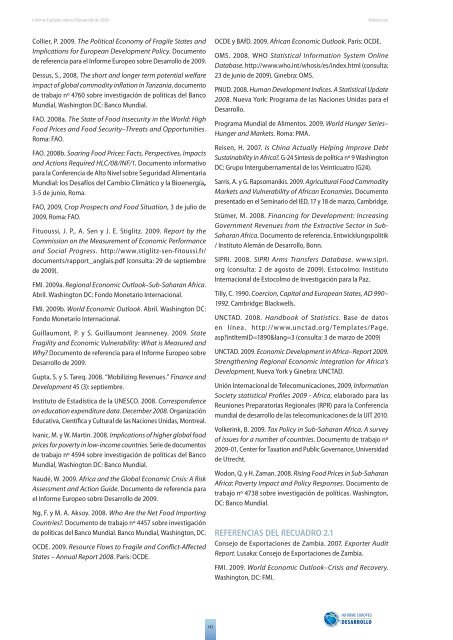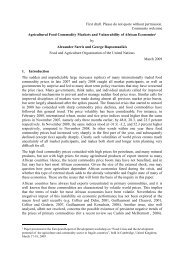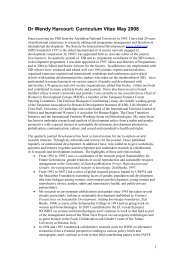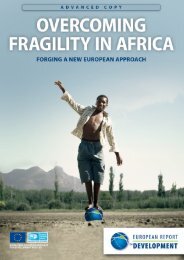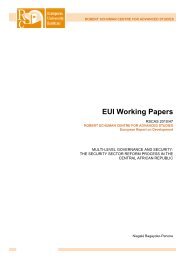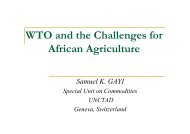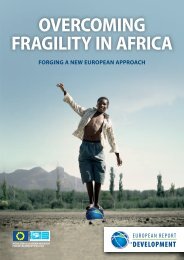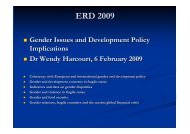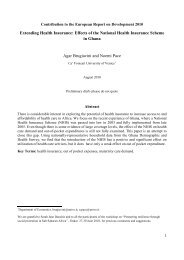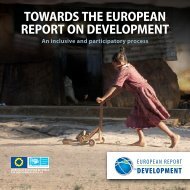desarrollo
desarrollo
desarrollo
You also want an ePaper? Increase the reach of your titles
YUMPU automatically turns print PDFs into web optimized ePapers that Google loves.
SOBRE<br />
Informe Europeo sobre el Desarrollo de 2009<br />
Referencias<br />
Collier, P. 2009. The Political Economy of Fragile States and<br />
Implications for European Development Policy. Documento<br />
de referencia para el Informe Europeo sobre Desarrollo de 2009.<br />
Dessus, S., 2008, The short and longer term potential welfare<br />
impact of global commodity inflation in Tanzania, documento<br />
de trabajo nº 4760 sobre investigación de políticas del Banco<br />
Mundial, Washington DC: Banco Mundial.<br />
FAO. 2008a. The State of Food Insecurity in the World: High<br />
Food Prices and Food Security–Threats and Opportunities.<br />
Roma: FAO.<br />
FAO. 2008b. Soaring Food Prices: Facts, Perspectives, Impacts<br />
and Actions Required HLC/08/INF/1. Documento informativo<br />
para la Conferencia de Alto Nivel sobre Seguridad Alimentaria<br />
Mundial: los Desafíos del Cambio Climático y la Bioenergía,<br />
3-5 de junio, Roma.<br />
FAO, 2009, Crop Prospects and Food Situation, 3 de julio de<br />
2009, Roma: FAO.<br />
Fituoussi, J. P., A. Sen y J. E. Stiglitz. 2009. Report by the<br />
Commission on the Measurement of Economic Performance<br />
and Social Progress. http://www.stiglitz-sen-fitoussi.fr/<br />
documents/rapport_anglais.pdf (consulta: 29 de septiembre<br />
de 2009).<br />
FMI. 2009a. Regional Economic Outlook–Sub-Saharan Africa.<br />
Abril. Washington DC: Fondo Monetario Internacional.<br />
FMI. 2009b. World Economic Outlook. Abril. Washington DC:<br />
Fondo Monetario Internacional.<br />
Guillaumont, P. y S. Guillaumont Jeanneney. 2009. State<br />
Fragility and Economic Vulnerability: What is Measured and<br />
Why Documento de referencia para el Informe Europeo sobre<br />
Desarrollo de 2009.<br />
Gupta, S. y S. Tareq. 2008. “Mobilizing Revenues.” Finance and<br />
Development 45 (3): septiembre.<br />
Instituto de Estadística de la UNESCO. 2008. Correspondence<br />
on education expenditure data. December 2008. Organización<br />
Educativa, Científica y Cultural de las Naciones Unidas, Montreal.<br />
Ivanic, M. y W. Martin. 2008. Implications of higher global food<br />
prices for poverty in low-income countries. Serie de documentos<br />
de trabajo nº 4594 sobre investigación de políticas del Banco<br />
Mundial, Washington DC: Banco Mundial.<br />
Naudé, W. 2009. Africa and the Global Economic Crisis: A Risk<br />
Assessment and Action Guide. Documento de referencia para<br />
el Informe Europeo sobre Desarrollo de 2009.<br />
Ng, F. y M. A. Aksoy. 2008. Who Are the Net Food Importing<br />
Countries. Documento de trabajo nº 4457 sobre investigación<br />
de políticas del Banco Mundial. Banco Mundial, Washington, DC.<br />
OCDE. 2009. Resource Flows to Fragile and Conflict-Affected<br />
States – Annual Report 2008. París: OCDE.<br />
O CDE y BAfD. 2009. African Economic Outlook. París: OCDE.<br />
OMS. 2008. WHO Statistical Information System Online<br />
Database. http://www.who.int/whosis/es/index.html (consulta:<br />
23 de junio de 2009). Ginebra: OMS.<br />
PNUD. 2008. Human Development Indices. A Statistical Update<br />
2008. Nueva York: Programa de las Naciones Unidas para el<br />
Desarrollo.<br />
Programa Mundial de Alimentos. 2009. World Hunger Series–<br />
Hunger and Markets. Roma: PMA.<br />
Reisen, H. 2007. Is China Actually Helping Improve Debt<br />
Sustainability in Africa. G-24 Síntesis de política nº 9 Washington<br />
DC: Grupo Intergubernamental de los Veinticuatro (G24).<br />
Sarris, A. y G. Rapsomanikis. 2009. Agricultural Food Commodity<br />
Markets and Vulnerability of African Economies. Documento<br />
presentado en el Seminario del IED, 17 y 18 de marzo, Cambridge.<br />
Stümer, M. 2008. Financing for Development: Increasing<br />
Government Revenues from the Extractive Sector in Sub-<br />
Saharan Africa. Documento de referencia. Entwicklungspolitik<br />
/ Instituto Alemán de Desarrollo, Bonn.<br />
SIPRI. 2008. SIPRI Arms Transfers Database. www.sipri.<br />
org (consulta: 2 de agosto de 2009). Estocolmo: Instituto<br />
Internacional de Estocolmo de Investigación para la Paz.<br />
Tilly, C. 1990. Coercion, Capital and European States, AD 990–<br />
1992. Cambridge: Blackwells.<br />
UNCTAD. 2008. Handbook of Statistics. Base de datos<br />
en línea. http://www.unctad.org/Templates/Page.<br />
aspintItemID=1890&lang=3 (consulta: 3 de marzo de 2009)<br />
UNCTAD. 2009. Economic Development in Africa–Report 2009.<br />
Strengthening Regional Economic Integration for Africa’s<br />
Development, Nueva York y Ginebra: UNCTAD.<br />
Unión Internacional de Telecomunicaciones, 2009, Information<br />
Society statistical Profiles 2009 - Africa, elaborado para las<br />
Reuniones Preparatorias Regionales (RPR) para la Conferencia<br />
mundial de <strong>desarrollo</strong> de las telecomunicaciones de la UIT 2010.<br />
Volkerink, B. 2009. Tax Policy in Sub-Saharan Africa. A survey<br />
of issues for a number of countries. Documento de trabajo nº<br />
2009-01, Center for Taxation and Public Governance, Universidad<br />
de Utrecht.<br />
Wodon, Q. y H. Zaman. 2008. Rising Food Prices in Sub-Saharan<br />
Africa: Poverty Impact and Policy Responses. Documento de<br />
trabajo nº 4738 sobre investigación de políticas. Washington,<br />
DC: Banco Mundial.<br />
REFERENCIAS DEL RECUADRO 2.1<br />
Consejo de Exportaciones de Zambia. 2007. Exporter Audit<br />
Report. Lusaka: Consejo de Exportaciones de Zambia.<br />
FMI. 2009. World Economic Outlook–Crisis and Recovery.<br />
Washington, DC: FMI.<br />
143<br />
INFORME EUROPEO<br />
ELDESARROLLO


